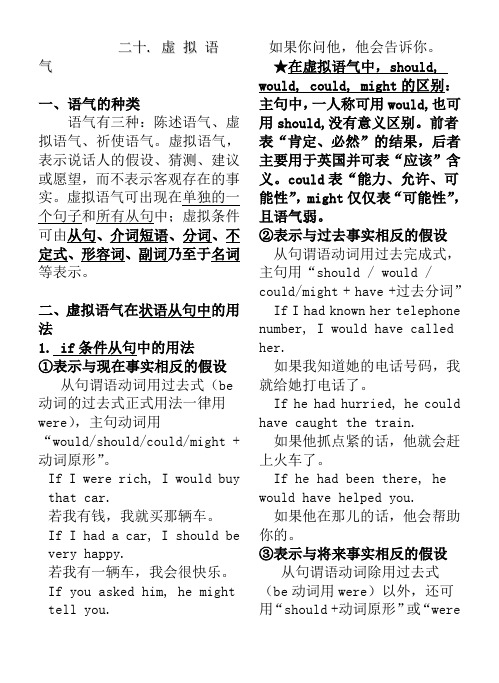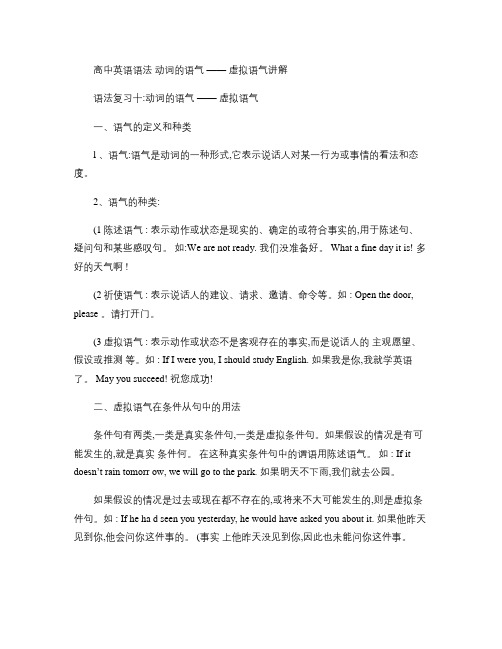语法复习十:动词的语气——虚拟语气
2020高中英语语法分类复习-虚拟语气

二十.虚拟语气一、语气的种类语气有三种:陈述语气、虚拟语气、祈使语气。
虚拟语气,表示说话人的假设、猜测、建议或愿望,而不表示客观存在的事实。
虚拟语气可出现在单独的一个句子和所有从句中;虚拟条件可由从句、介词短语、分词、不定式、形容词、副词乃至于名词等表示。
二、虚拟语气在状语从句中的用法1. if条件从句中的用法①表示与现在事实相反的假设从句谓语动词用过去式(be 动词的过去式正式用法一律用were),主句动词用“would/should/could/might +动词原形”。
If I were rich, I would buy that car.若我有钱,我就买那辆车。
If I had a car, I should be very happy.若我有一辆车,我会很快乐。
If you asked him, he might tell you.如果你问他,他会告诉你。
★在虚拟语气中,should, would, could, might的区别:主句中,一人称可用would,也可用should,没有意义区别。
前者表“肯定、必然”的结果,后者主要用于英国并可表“应该”含义。
could表“能力、允许、可能性”,might仅仅表“可能性”,且语气弱。
②表示与过去事实相反的假设从句谓语动词用过去完成式,主句用“should / would / could/might + have +过去分词” If I had known her telephone number, I would have called her.如果我知道她的电话号码,我就给她打电话了。
If he had hurried, he could have caught the train.如果他抓点紧的话,他就会赶上火车了。
If he had been there, he would have helped you.如果他在那儿的话,他会帮助你的。
高中英语2025届高考语法复习虚拟语气知识讲解

高考英语语法复习虚拟语气知识讲解一、基础知识(一)什么是虚拟语气谓语动词的作用不仅可以表示动作的时间、状态、假设(情感),也是一种语气(mood)的表现形式,表明说话的目的和意图。
(语气包含陈述语气、祈使语气、虚拟语气、疑问语气)虚拟语气用于表示假设、愿望、建议、命令等非真实或虚拟的情况,即与真实相反。
上学的时候老师经常举的一个例子,"If I were you"因为我不可能是你,这是一种不可能存在的事实,所以这是个虚拟语句。
总而言之英语中的虚拟语气可以分为两大体系:一是表示与事实相反的,或者是假象的情形,通常由if引导,叫做虚拟条件句;另一个体系是在名词从句中使用虚拟语气,表示建议,命令或者要求等语气,类似于上述美剧常用的台词。
(二)虚拟语气的用法这一部分我们主要用虚拟语气在条件句中的用法作为讲解与现在事实相反:If I had a map, I would lend it to you.如果我有地图我就借给你。
(但我没有)与将来事实相反:If I were to do the job, I would do it in a different way. 要是我来做这工作,我会是另一种做法。
(言外之意不是我做这个工作,用虚拟表达是我做这份工作的可能性很低)与过去事实相反:If anything had happened, he would have let us know.如果发生了什么情况,他早就通知我们了。
(所以没事发生)它们的共性都是表示与事实相反或者实现可能性不大3.特殊情况①在极少情况下,从句的谓语动词用原形,主句的谓语动词可用陈述语气(比较官方,正式,大气的说法,口语很少使用)If that be the official view, it cannot be accepted.如果这是官方的看法,这是不能接受的。
②if可以省略,但是语序要改为倒装Were I Tom I would refuse.如果我是汤姆我会拒绝。
高考英语语法复习情态动词和虚拟语气

4
5. Should I open the window? 我可以开窗户吗? 6. You shouldn't be sitting in the sun. 你不应该坐在阳光下。
4
7. It's 4:30. They should be in New York by now. 现在是4点半,他们应该到达纽约了。 8. If he should drop in, give him my message. 他若来访,就将我的消息给他。
(2)He shall be punished if he disobeys. 你照我的样子办。
他若不服从就要受到处罚。
4
3. (1)You shall have my answer tomorrow. (2)She shall get her share. (1)你明天可以得到我的答复。
(2)她可以得到她的一份。 4. (1)Shall I get you some coffee, Miss Fleure?
除了 can , would 以外,英语中还有很多情态动 词 。 常 见 情 态 动 词 有 : must , can(could) , may(might) , ought to , need , dare shall(should) , will(would) have (had) to,used to, had better,would rather。 注意:need,dare也可用作实义动词。
6
4. May you succeed.
祝你成功。
5. (1)You may well say so.
动词的虚拟语气

动词的虚拟语气动词的虚拟语气是指用来表示不真实、假设或情态的动作、状态或愿望的一种语法形式。
在汉语中,虚拟语气的表达主要通过情态动词、副词、词组和语序等方式实现。
而在英语中,虚拟语气则通过动词的不同形式来表示。
一、虚拟语气的类型动词的虚拟语气包括了三种类型:虚拟条件语气、虚拟假设语气和虚拟情态语气。
1. 虚拟条件语气虚拟条件语气用来表示对现实情况的讨论和假设。
其形式上常通过动词的过去式形式或者过去完成式形式来表示。
例如:- If I were a bird, I would fly in the sky.(如果我是一只鸟,我就会在天空中飞翔。
)- If I had studied harder, I would have passed the exam.(如果我学习更努力一些,我就能通过考试。
)虚拟条件语气在不同的条件下存在多种不同的表达形式,例如对现在或未来的假设使用过去式,对过去的假设使用过去完成式等。
2. 虚拟假设语气虚拟假设语气用来表示与现实相反的假设情况,通常通过动词的过去式或者过去完成式形式来表示。
例如:- I wish I were rich.(我希望我是有钱人。
)- If only I had known the truth earlier!(要是我早知道真相就好了!)虚拟假设语气常出现在对现在或过去的愿望、遗憾或建议等情况下,表达一种与现实相反的假设情况。
3. 虚拟情态语气虚拟情态语气通过诸如"should", "could", "would", "might"等情态动词的不同形式来表示。
它用来表达对过去、现在或将来的假设、推测和猜测。
例如:- I suggested that he should go to the party.(我建议他去参加派对。
)- She might have left early.(她可能早已离开。
虚拟语气+课件+2023届高考英语一轮复习

Review-Adverbial clauses of condition 条件状语从句复习
再观察以下句子
学习新知
If the city hadn’t built the underground system, getting around wouldn’t be so convenient. 观察本句,并回答以下问题: 这个句子是不是虚拟条件句? 有没有遵循上述表格中的规律? 与上述表格中的规律有何不同?
Review-Adverbial clauses of condition 条件状语从句复习
Please translate the following sentences into English. 1.如果你改正错误,那么下一次你会取得进步。 If you correct your mistakes, you will make progress in the next time.
主将从现
学习新知—条件句中的虚拟语气
观察下面的句子,回答下面问题
1.If this airport hadn’t been constructed, our city wouldn’t have attracted so many tourists.
2.If a bigger airport were built, travelers’ experiences should be greatly improved.
学习新知——其他情况
回答下面问题:
1.这些能够表示虚拟语气的词在意义上有何共性? 2.上面句子虚拟语气表示形式与前两种情况有不 同之处吗?相同的地方呢?
高中英语语法动词的语气虚拟语气讲解

高中英语语法动词的语气——虚拟语气讲解语法复习十:动词的语气——虚拟语气一、语气的定义和种类l 、语气:语气是动词的一种形式,它表示说话人对某一行为或事情的看法和态度。
2、语气的种类:(1陈述语气 : 表示动作或状态是现实的、确定的或符合事实的,用于陈述句、疑问句和某些感叹句。
如:We are not ready. 我们没准备好。
What a fine day it is! 多好的天气啊 !(2祈使语气 : 表示说话人的建议、请求、邀请、命令等。
如 : Open the door, please 。
请打开门。
(3虚拟语气 : 表示动作或状态不是客观存在的事实,而是说话人的主观愿望、假设或推测等。
如 : If I were you, I should study English. 如果我是你,我就学英语了。
May you succeed! 祝您成功!二、虚拟语气在条件从句中的用法条件句有两类,一类是真实条件句,一类是虚拟条件句。
如果假设的情况是有可能发生的,就是真实条件何。
在这种真实条件句中的谓语用陈述语气。
如 : If it doesn’t rain tomorr ow, we will go to the park. 如果明天不下雨,我们就去公园。
如果假设的情况是过去或现在都不存在的,或将来不大可能发生的,则是虚拟条件句。
如 : If he ha d seen you yesterday, he would have asked you about it. 如果他昨天见到你,他会问你这件事的。
(事实上他昨天没见到你,因此也未能问你这件事。
在含有虚拟条件句的复合句中,主句和从句的谓语都要用虚拟语气。
现将虚拟条件从句和主句的动词形式列表如下 :从句主句与现在事实相反动词的过去式(be 的过去式一般用 werewould/ should/ could/ might + 动词原形与过去事实相反had + 过去分词would/ should/ could/ might + have + 过去分词与将来事实相反动词过去式, should + 动词原形, were to + 动词原形would/ should/ could/ might + 动词原形注 : 主句中的 should 只用于 I 、 we ,但在美国英语中, should 常被 would 代替;从句中的 should 可用于各种人称。
动词时态虚拟语气
动词时态虚拟语气动词时态虚拟语气是英语语法中常用的一种语法结构,用来表达虚拟或假设情况下的动作、状态或想法。
虚拟语气主要通过变化动词的形式来表示,常见的包括过去时态虚拟语气和现在时态虚拟语气。
本文将重点介绍这两种虚拟语气的使用情况和相应语法规则。
一、过去时态虚拟语气过去时态虚拟语气用来表示对过去情况的猜测、假设或条件,并且常与"if"引导的条件从句一同出现。
过去时态虚拟语气的基本结构为:if + 主语 + had + 动词过去分词,主句使用"would/could/should/might + 动词原形"的形式。
例句1:If I had studied harder, I would have passed the exam.如果我学得更努力一些,我就能通过考试了。
例句2:If he hadn't missed the bus, he would have arrived on time.如果他没有错过公交车,他就能准时到达。
二、现在时态虚拟语气现在时态虚拟语气用来表示对现在情况的猜测、假设或建议,并且常与"wish"、"if only"、"would rather"等词语引导的句子中出现。
现在时态虚拟语气的基本结构为:主语 + 动词原形(be动词的虚拟语气形式为were,与所有主语一致)。
例句1:I wish I were taller.我希望我能更高一些。
例句2:If only it would stop raining!要是天气停止下雨就好了!除了以上两种情况外,虚拟语气还可以用于表示命令、请求、建议、建议、愿望等其他情况。
如:例句1:She requested that he write the report.她要求他写那份报告。
例句2:I would advise you to take a break.我建议你休息一下。
2020高考英语热门考点强化专练十:动词的语气——虚拟语气
2020高考英语热门考点强化专练十:动词的语气——虚拟语气语法复习十:动词的语气——虚拟语气一、语气的定义和种类l、语气:语气是动词的一种形式,它表示说话人对某一行为或事情的看法和态度。
2、语气的种类:(1)陈述语气:表示动作或状态是现实的、确定的或符合事实的,用于陈述句、疑问句和某些感叹句。
如:We are not ready.我们没准备好。
What a fine day it is!多好的天气啊!(2)祈使语气:表示说话人的建议、请求、邀请、命令等。
如: Open the door, please。
请打开门。
(3)虚拟语气:表示动作或状态不是客观存在的事实,而是说话人的主观愿望、假设或推测等。
如: If I were you, I should study English.如果我是你,我就学英语了。
May yousucceed!祝您成功!二、虚拟语气在条件从句中的用法条件句有两类,一类是真实条件句,一类是虚拟条件句。
如果假设的情况是有可能发生的,就是真实条件何。
在这种真实条件句中的谓语用陈述语气。
如: If it doesn’t raintomorrow, we will go to the park.如果明天不下雨,我们就去公园。
如果假设的情况是过去或现在都不存在的,或将来不大可能发生的,则是虚拟条件句。
如:If he had seen you yesterday, he would have asked you about it.如果他昨天见到你,他会问你这件事的。
(事实上他昨天没见到你,因此也未能问你这件事。
)在含有虚拟条件句的复合句中,主句和从句的谓语都要用虚拟语气。
现将虚拟条件从句和主句的动词形式列表如下:从句主句与现在事实相反动词的过去式(be的过去式一般用were)would/ should/ could/ might +动词原形与过去事实相反had +过去分词would/ should/ could/ might + have +过去分词与将来事实相反动词过去式,should +动词原形,were to +动词原形would/ should/could/ might +动词原形注:主句中的should只用于I、we,但在美国英语中,should常被would代替;从句中的should可用于各种人称。
英语语法—虚拟语气(最全)
虚拟语气1.虚拟语气的概念虚拟语气把动作当作一种只存在于讲话人想象中的“假设”或“推测”,而不是当作客观现实中的真实事件。
它表达的是建议、不满、怀疑、忧虑、推测、假设、想象、祝愿等。
2.虚拟语气用于非真实条件句英语中的条件句有两种:真实条件句和非真实条件句。
真实条件句实现的可能性非常大,常用if, unless, as long as, so long as, once等引导,谓语动词常用陈述语气;非真实条件句常表示不能实现或纯假象的情况,谓语动词要用虚拟语气。
非真实条件句包括虚拟条件句、推测条件句、错综时间条件句。
①虚拟条件句、推测条件句虚拟条件句可分为两类:一类是叙述与现在事实相反的情况,一类是叙述与过去事实相反的情况。
另外,还有一类用于推测将来的情况,也称作推测条件句。
从句中提出一种与客观现实不相符或根本不可能存在的条件,主句会产生一种不可能获得的结果。
句中的虚拟语气根据不同的时间有3种不同的形式:I would lend him the money if he asked me.他要是问我,我愿意借钱给他。
(意愿)If he had time, he should do it.要是有时间,他愿意做那件事。
(意愿)He could move the big stone if he should try.努力的话,他能搬动那块大石头。
(能力)If he forgot to come, you could go instead.他要是忘了没来,你可要替他来。
(许诺)A.与现在事实相反If I had enough money, I would buy a computer.如果我有足够的钱,我将买一台电脑。
(实际上没有) Were I you I would refuse.如果我是你我会拒绝。
(我不是你)注:从句有时可用If it were not for这种句型,表示“若不是……”。
It it weren’t for your help, we would be in serious trouble.若不是你帮忙,我们会遇到大麻烦。
英语语法总复习虚拟语气
A. has
B. will have
C. can have
视 频
9.I wish you _____ me all this.
10. I wish I _____ what was going to happen.
A. knew
夏
B. will know
电 信
网
A. didn't tell
B. tell
络
视 频
advice.
课 堂
PRACTICE 1: Fill in the blanks.
the exam, he ________________ (pass) would have passed
it already.
宁
夏
________________ would have caught (catch) the first train.
I wish it would rain tomorrow.
A. stayed
B. had stayed
C. could stay
A. will go B. doesn't go
C. wouldn't go
视 频
2. I wish he _____ out every night.
3. I wish I _____ ten years younger. A. were B. will be
If 从句谓语形式 动词过去式(或 were)
主句谓语形式 should/ would /could/ might+ 动词原形
宁
与将来事实 相反
夏
电 信
与过去事实 相反
网
- 1、下载文档前请自行甄别文档内容的完整性,平台不提供额外的编辑、内容补充、找答案等附加服务。
- 2、"仅部分预览"的文档,不可在线预览部分如存在完整性等问题,可反馈申请退款(可完整预览的文档不适用该条件!)。
- 3、如文档侵犯您的权益,请联系客服反馈,我们会尽快为您处理(人工客服工作时间:9:00-18:30)。
语法复习十:动词的语气——虚拟语气一、语气的定义和种类l、语气:语气是动词的一种形式,它表示说话人对某一行为或事情的看法和态度。
2、语气的种类:(1)陈述语气: 表示动作或状态是现实的、确定的或符合事实的,用于陈述句、疑问句和某些感叹句。
如:We are not ready. 我们没准备好。
What a fine day it is!多好的天气啊!(2)祈使语气: 表示说话人的建议、请求、邀请、命令等。
如: Open the door, please。
请打开门。
(3)虚拟语气: 表示动作或状态不是客观存在的事实,而是说话人的主观愿望、假设或推测等。
如: If I were you, I should study English. 如果我是你,我就学英语了。
May you succeed! 祝您成功!二、虚拟语气在条件从句中的用法条件句有两类,一类是真实条件句,一类是虚拟条件句。
如果假设的情况是有可能发生的,就是真实条件何。
在这种真实条件句中的谓语用陈述语气。
如: If it doesn’t rain tomorrow, we will go to the park. 如果明天不下雨,我们就去公园。
如果假设的情况是过去或现在都不存在的,或将来不大可能发生的,则是虚拟条件句。
如: If he had seen you yesterday, he would have asked you about it. 如果他昨天见到你,他会问你这件事的。
(事实上他昨天没见到你,因此也未能问你这件事。
)在含有虚拟条件句的复合句中,主句和从句的谓语都要用虚拟语气。
现将虚拟条件从句和主注: 主句中的should只用于I、we,但在美国英语中,should常被would代替;从句中的should 可用于各种人称。
l、表示与现在事实相反的假设和结果。
如: If my brother were here, everything would be all right. 要是我哥哥在这儿,一切都没问题了。
2、表示与过去事实相反的假设和结果。
如: If you had taken my advice,you wouldn't (couldn’t) have failed in the exam. 如果你按照我的建议去做,你一定不会(不可能)考试不及格。
3、表示与将来事实可能相反的假设和结果。
如: If it were Sunday tomorrow, I should (would,could,might) go to see my grandmother. 如果明天是星期天,我就(可能)去看望我奶奶。
If it were to snow this evening, they would not go out. 如果今晚下雪,他们将不出去了。
4、有时条件从句中的动作和主句中的动作发生的时间不一致(表示错综时间的虚拟语气),这时动词的形式要根据它所表示的时间加以调整。
例如: If you had listened to the doctor, you would be all right now. 如果你当初听了医生的话,身体现在就好了。
(从句动作指过去,主句动作指现在)5、虚拟条件句可以转换成下列形式:(l)省略连词if。
在书面语中,如果虚拟条件从句中有were,had 或should,可以把if省略,把这几个词放到主语之前,构成主谓倒装。
例如: Should he come (If he should come), tell him to ring me up. 他要是来了,让他给我打个电话。
Were I you (If I were you), I would not do it. 我要是你,就不做这事。
(2)用介词短语代替条件状语从句。
有时假设的情况并不用条件从句表示出来,而是通过介词短语来表示。
如: Without air (If there were not air), there would be no living things. 如果没有空气的话,就不会有生物了。
But for your help (If it hadn’t been for your help) I couldn’t have done it. 要是没有你的帮助,我就不可能完成这件事。
假设的情况有时可以通过上下文或其他方式表现出来。
如: I was busy that day. Otherwise I would have gone there with them. (If I hadn’t been busy that day, I would have gone there with them.) 我那天很忙,否则,我就和他们一起去那儿了。
(如果我那天不忙的话,我就……);I would have finished the work, but I have been ill. (If I hadn’t been ill, I would have finished the work.) 我本来该完成这项工作的,但我生病了。
(如果我没生病的话,我就会完成……)6、省去条件从句或主句:表示虚拟语气的主句或从句有时可以省略,但其含义仍可以推知。
(1)省去条件从句。
如: You could have washed your clothes yourself. 你本可以自已洗衣服的。
省去了"If you had wanted to")(事实是:你自己没洗衣服,因为你不想洗。
)(2)省去主句(常用以表示愿望)。
如: If my grandmother were with me! 如果我的祖母与我在一起多好啊!(事实是:祖母已不在世。
);If only she had not left! 如果她没走就好了!(事实是:她已经走了。
)三、虚拟语气的其他用法l、虚拟语气在主语从句中的用法:在"It is important (strange,natural,necessary)that…"这类句型里,that所引导的主语从句中的谓语动词常用“s hould十动词原形”结构,表示某事是"重要"、"奇怪"、"自然"、"必要"等意义。
如: It is important that every member (should) inform himself of these rules. 重要的是每个成员知道这些规则。
2、虚拟语气在宾语从句中用法:(1)在动词wish后的宾语从句中,表示与现在或过去的事实相反,或对将来的主观愿望,从句通常省略连词that。
1)表示对现在情况的虚拟:从句动词用过去式或过去进行式(be动词一般用were)。
如: I wish I knew the answer to the question. 我希望知道这个问题的答案。
(可惜不知道);2)表示对过去情况的虚拟:从句动词常用"had十过去分词"。
如: I wish (wished) I hadn’t spent so much money. 我后悔不该花那么多钱。
(实际上已经花掉);3)表示对将来的主观愿望:谓语动词形式为"would十动词原形"。
此时要注意,主句的主语与从句的主语不能相同,因为主句的主语所期望的从句动作能否实现,取决于从句主语的态度或意愿(非动物名词除外)。
如: I wish it would stop raining. 但愿雨能停止;I wish you would come soon. 但愿你立刻来。
(2)在suggest,demand,order,propose,insist,command,request,desire等动词后的宾语从句中,谓语动词用“should + 动词原形”,表示建议、要求、命令等。
如: I demand that he (should) answer me immediately. 我要求他立刻答复我。
3、虚拟语气在状语从句中的用法(1)在带有even if/ even though引导的让步状语从句的主从复合句中,主句和从句都用虚拟语气,动词形式与含有非真实条件句的虚拟语气相同。
如: Even if he had been ill, he would have gone t his office. 即使生了病,他俩去办公室。
(2)由as if或as though引导的状语从句表示比较或方式时。
从句谓语形式为动词的过去式(be 用were)或“h ad十过去分词”。
如: He treated me as if I were a stranger. 他那样对待我,好像我是陌生人似的。
She talked about the film as if she had really seen it. 她谈论那部影片,就好像她确实看过一样。
注:如果表示的事情可能会发生,那么方式状语从句中的谓语动词可用陈述语气。
(3)在in order that或so that引导的目的状语从句中,谓语动词多用“could或might(有时也用should)+ 动词原形”。
如: Mr green spoke slowly so that his students could (might) hear clearly. 格林先生说得很慢,好让学生听清楚。
4、虚拟语气在定语从句中的用法:在"It is time (that) …"句型中,定语从句的谓语动词常用虚拟语气表示将来,动词形式一般用过去式,意思是"该干某事的时候了"。
如: I t’s (high) time we did our homework. 我们该做作业了。
5、虚拟语气在简单句中的用法(1)情态动词的过去式用于现在时态时,表示说话人的谦虚、客气、有礼貌,或委婉的语气,常见于日常会话中。
如: It would be better for you not to stay up too late. 你最好别太晚睡觉。
(2)在一些习惯表达中。
如: I would rather not tell you. 我宁愿不告诉你。
(3)用“may + 动词原形”表示"祝愿"、"但愿”,此时may须置于句首(多用于正式文体中)。
如:May you be happy!祝你快乐!May good luck be yours.祝你顺利。
练习、虚拟语气(B)1. If I ____ where he lived, I ____ a note to him.A. knew, wouldB. had known, would have sentC. know, would sendD. knew, would have sent(A)2. If they ____ earlier than expected, they ____ here now.A. had started, would beB. started, might beC. had started, would have beenD. will start, might have been(D)3. I didn’t know his telephone number. ____ it, I ____ then.A. Had I known, would ring him upB. Should I know, would have rung him upC. If I knew; would ring him upD. Had I known; would have rung him up (A)4. Mary is ill today. If she _____ , she ____ absent from school.A. were not ill; wouldn' t beB. had been ill; wouldn't have beenC. had been ill; should have beenD. hadn't been ill; could be(B)5. Were I to do it, I ________ it some other way.A. will doB. would doC. would have doneD. were to do (C)6. I ________ him the answer ________ possible, but I was so busy then.A. could tell; if it had beenB. must have told; were itC. should have told; had it beenD. should have told; should it be(D)7. Without your help, we________ so much.A. won ' t achieveB. didn ' t achieveC. don't achieveD. wouldn't have achieved(A)8. You didn't take his advice. ________ his advice, you ________ such a mistake.A. Had you taken; wouldn't have madeB. If you had taken; would makeC. Were you lo take; shouldn t have madeD. Have you taken; won t have made (B) 9. We wish we ____ what you did when we were at high school.A. didB. could have doneC. have doneD. should do(C)10. She wishes she ____ to the theatre last night.A. wentB. would goC. had goneD. were going(C)11. Tom is very short now. His mother wishes that he ________ be tall when he grows up.A. couldB. shouldC. wouldD. were able to (C)12. My sister advised me that I ________ accept the invitation.A. couldB. mustC. shouldD. might(D)13. He asks that he ________ an opportunity to ex plain why he’s refused to go there.A. is givenB. must giveC. should giveD. be given(D)14. Do you think of Wang Fang's suggestion that he ________ Mr. Li to the party?A. will inviteB. have invitedC. is invitedD. invite(B)15. I insisted that he ________ at once.A. be goneB. goC. would goD. might go(A)16. Li Ming insisted that he ________ anything at all.A. hadn ' t stolenB. shouldn ' t stealC. doesn ' t stealD. stealD)17. It is quite natural that my coming late again ________ them very angry.A. had madeB. would makeC. makesD. make(A)18. He acted as if he ________ everything in the world.A. knewB. knowsC. has knownD. won't know(A)19. Read it aloud so that I ________ you clearly.A. may hearB. will hearC. hearD. have heard(C)20. They got up early in order that they ________ they first train.A. caughtB. will catchC. might catchD. shall catch (D)21. I am sorry that he ________ in such poor health.A. areB. shall beC. wereD. should be (C)22. That is a good book. You ________ it yesterday.A. could buyB. should buyC. should have boughtD. bought (D)23. It is high time we ________ home.A. will goB. would goC. have goneD. went(A)24. I ' d rather that you ________ home.A. wentB. have goneC. will goD. had gone(D)25. If only I _________ to the lecture!A. listenB. will listenC. am listeningD. had listened(B)26. ---- If he_____ , he ______ that food. ---- Luckily he was sent to the hospital immediately.A. was warned; would not takeB. had been warned; would not have takenC. would be warned; had not takenD. would have been warned; had not taken(D)27.I didn' t see your sister at the meeting. If she _________, she would have met my brother.A. has comeB. did comeC. cameD. had comeD)28. Without electricity, human life ________ quite different today.A. isB. will beC. would have beenD. would be (A)29. He ________ you more help, even though he was very busy.A. might have givenB. might giveC. may have givenD. may give(A)30. If city noises _______ from increasing, people _______ shout to be heard even at the dinnertable 20 years from now.A. are not kept; will have toB. are not kept; have toC. do not keep; will have toD. do not keep; have to(D)31. Mike's father, as well as his mother, insisted that he ________ home.A. stayedB. could stayC. has stayedD. stay (A)32. Mr. Smith insisted that he ________ the work all.A. had doneB. have doneC. didD. so(B)33. Jane would never have gone to the party ________ that Mary would come to see her.A. has she knownB. had she known C'. if she know D. if she has known(B)34. If you had enough money, what ________ ?A. will you buyB. would you buyC. would you have boughtD. will you have bought (D)35. If you ________ that film late last night, you wouldn't be so sleepy.A. didn't seeB. haven't seenC. wouldn’t have seenD. hadn’t seen (D)36. Our monitor requested that ________.A. all the class studied more carefully the problemB. the problem was more carefully studiedC. with great care the problem could be studiedD. all the class study the problem more carefully(A)37. ---- Would you have called her up had it been possible?---- Yes, but I ________. busy doing my homework..A. wasB. wereC. had beenD. would be(B)38. His tired face suggested that he ________ really tired after the long walk.A. had beenB. wasC. beD. should be(D)39. It is important that we ________.A. shall close the window before we leaveB. will close the window before we leaveC. must close the window before we leaveD. close the window before we leave(C)40. I didn't know his telephone number, otherwise I ______ him.A. had telephonedB. would telephoneC. would have telephonedD. telephone。
